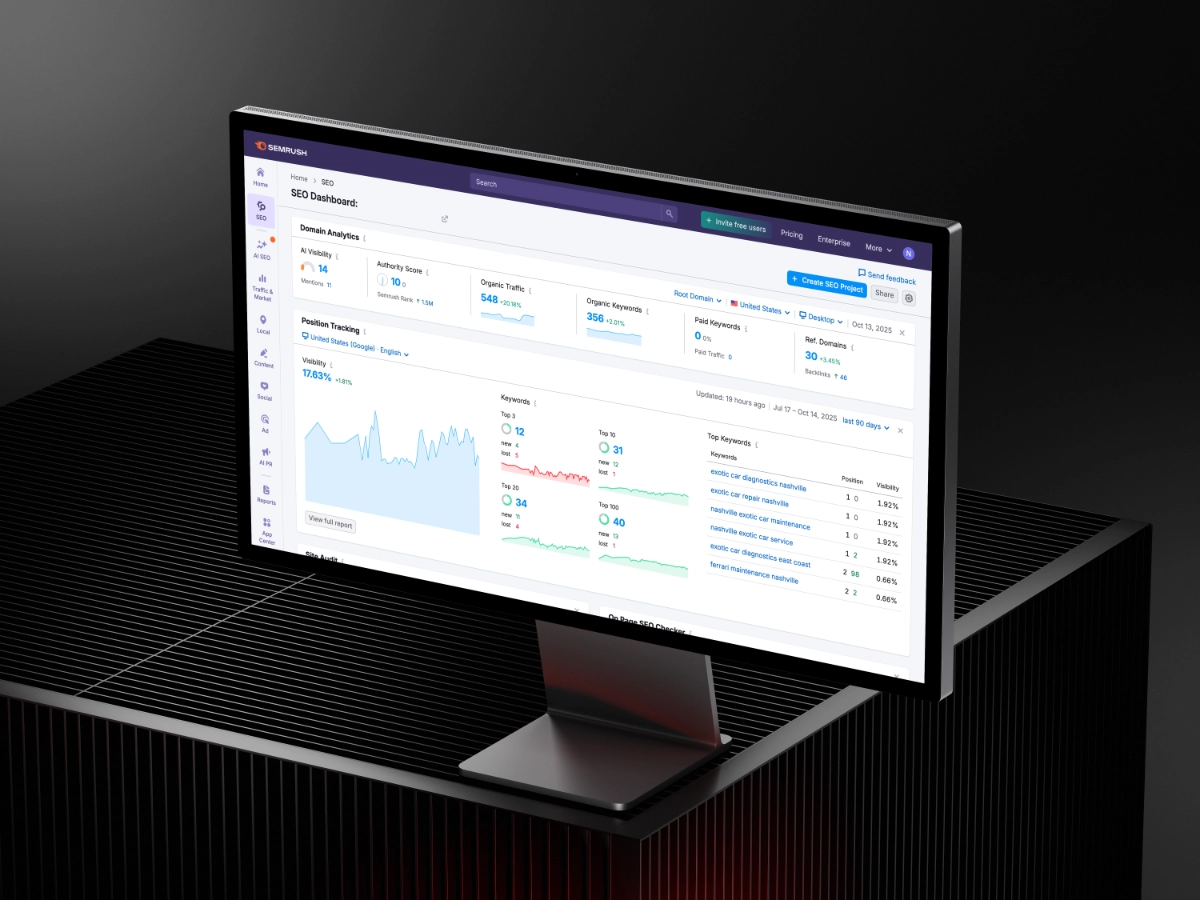Webflow vs Wordpress in 2024
By Nicholas Reed
August 29, 2024

Over the last few years, website design and development trends and capabilities have drastically changed. The rise of the best website builder platforms has even overtaken custom coded builds for the majority of businesses.
With that being said, there are a few website builders that are the ones that people are typically debating between.
At 253 Media, our clients are often comparing Webflow vs. Wordpress to determine which is the best platform for their website. This conversation typically stems from their current website being on Wordpress, but they are considering migrating to Webflow.
Why would you want to do a Wordpress to Webflow migration?
Before we dive into the nitty gritty details to help you make a decision, let’s break down the major differences between the two tools by summarizing both.
What is Wordpress?
Wordpress is an open-source CMS that you or your development team can install onto your own server. According to Google’s generative AI, as of August 2024, more than 810 million websites use WordPress, which is 43.5% of all websites globally.
Wordpress utilizes templates that are relatively beginner friendly to help you get your site built quickly. To add functionally, Wordpress incorporates an open-source plug-in library that allows you to install specific tools to add the functionality that your specific website needs.
Thanks to its e-commerce capabilities with WooCommerce, Wordpress is a moldable solution for e-commerce that gives merchants a ton of flexibility with how they sell online.
Lastly, Wordpress allows full-stack developers to custom code websites that aren’t tied to the constraints of a theme or template.This offers a ton of flexibility for developers using Wordpress (more on this later).
Now let’s move onto Webflow.
What is Webflow?
Webflow is a closed-source development software and CMS that allows users to design, develop, and host their website all in a single centralized place. No need for exporting code and setting up complex services and hosting providers! According to BuiltWith, there are currently more than 580 thousand websites on the Webflow platform with overall usage trending upward rapidly.
Although Webflow has the ability to utilize both templates and custom libraries, Webflow excels with its blank canvas designer that gives users the ability to bring full custom websites to life without ever writing a line of code.
New to Webflow in 2024, Webflow launched its own App Library to expand functionality without touching code. Although similar to Wordpress’s plug-in library, Webflow’s App Library is closed source and requires a rigorous approval process to keep quality standards high.
Why do so many more people use Wordpress than Webflow?
Wordpress launched on May 27, 2003 whereas Webflow launched on August 5, 2013, almost exactly a decade later! Needless to say, Webflow had some catching up to do and they are doing just that. In fact, over the last few years, search trends for Wordpress are trending down whereas Webflow is trending up.
The other two main reasons why Wordpress has more users is because of the ease of use to launch something ultra simple. For simple sites like blogs, Wordpress was always the go-to option for people, however Webflow’s templates and all-in-one platform make simple sites a breeze to launch.
Up until the last decade or so, no-code website builders weren’t a viable option for building a high-performance website so developers leaned on Wordpress’s CMS to store content on their owner server.
Lastly, for people who are on a tight budget and need the cheapest hosting solution on the market, Wordpress is a great option because you can set up your own server and host your own site where Webflow requires a site plan that starts are $14/mo.
Now that you have a clear understanding of the major differences between Weblow and Wordpress as platforms, let’s dive into the four key reasons why businesses are migrating to Webflow from Wordpress and why you should consider it too.
Lightning Fast, Clean Visual Designer
Unlike Wordpress’s rigid themes that force you to write messy, complex code or mold your vision to theme, Webflow starts with a blank canvas with unlimited design capabilities.
Just like if you were handwriting code from scratch, Webflow developers can bring their vision to life by creating anything imaginable. Instead of having to use <div> tags and <style> </style> tags to design, adding and styling is as simple as a few clicks!
With Webflow, you don’t need to be a developer to build amazing websites. In fact, you don’t even need to know how to write a line of code! This means that anyone from a non-technical solo business owner to a non-developer to a full-stack developer can be comfortable building and maintaining a Webflow website.
With that being said, Webflow makes it easy to inject custom html, css, and javascript, integrate with React, and even headless APIs to expand the native power of Webflow.
The sky's the limit with Webflow’s designer since we are just visually writing code. Webflow is ideal for everything from simple landing pages to highly-complex animated and immersive experience websites.
Buildable and Visual CMS
One of the most powerful aspects of Webflow is its robust and highly moldable content management systems (CMS).
With Webflow, you and your team can store all kinds of content from a simple database of testimonials to complex, logic-based landing pages. This allows you to utilize consistent content throughout the site while being able to quickly add more content to expand and update your website.
Webflow’s CMS also improves team collaboration by giving different team members the ability to utilize content from other users quickly and easily.
Perhaps the most powerful function of the Webflow CMS is it’s visual editing capabilities that allow you to modify CMS content directly in the Webflow Designer while being able to publish or achieve CMS items without interfering with the rest of your site. This makes team collaboration and site updates a breeze without worrying of publishing an update that wasn’t ready for the world.
Never update a theme or plugin again
One of the biggest complaints about Wordpress and why thousands of businesses are leaving Wordpress to migrate to Webflow is because of the ongoing updates and maintenance that Wordpress requires.
Wordpress itself requires updates, themes need updating, and even the plug-ins that give your website functionality need to be updated regularly. If you miss an update, your site can face major bugs that destroy the user experience. Plus, since plug-ins and themes are open-source by third-party developers, they can lose support and become incompatible with the rest of your site. Because of all the technical support needed for Wordpress, maintenance on Wordpress sites can be very expensive.
At 253 Media, we’ve seen some nightmares with sites randomly breaking due to plug-ins and themes going out of date and losing compatibility. It can make a huge mess!
Thankfully, Webflow never needs to be updated and since Webflow doesn’t rely on third-party themes or plug-ins for functionality, nothing needs to be updated there either. Either the highly-vetted apps auto-update so you can rest assured that your site is as reliable as possible.
In fact, we’ve built sites from clients in 2017 that are still up and running and haven’t been touched at all since launch! For businesses that don’t change or just need information online, Webflow is a great option because it can be a set and forget platform.
Collaborate and publish with lightning speed and team flexibility
For companies with multiple teams that need to update the site, such as a marketing team, a design team, and a product team, Webflow makes it easy for everyone to get their job done quickly and reliably.
Because Webflow’s visual designer uses the same core concepts that full-stack developers are familiar with, it’s easy for your product development team to make updates.
But what about making new marketing pages or adding SEO content?
Because Webflow is a no-code platform, and thanks to custom libraries, internal page and section templates, and the CMS, its easy for non-developers to make the updates they need to make.
This creates a smooth and fast workflow that doesn’t interrupt either team's day to day efficiency and allows teams to work together with ease. This process can also be applied to smaller companies working with a Webflow design agency like 253 Media because our developers are able to build websites that can be used day to day by solopreneurs, non-technical founders and marketing teams.
Ultra secure and all-inclusive hosting
Security is something that we take very seriously at 253 Media for our clients information, which is another reason why Webflow is our website platform of choice.
Unlike Wordpress being an open source tool that relies on third-party tools and servers, Webflow is all inclusive from capabilities to hosting. This creates a much more secure platform due to its centralized data storage that isn’t shared with numerous vendors. In fact, according to Webflow’s security statement, Webflow is proud to be SOC 2 Type II certified by an independent third-party auditor ensuring customers that our security controls have been attested and validated.
Another major factor when comparing Webflow and Wordpress is SEO capabilities and native tools.
Out of the box, Wordpress doesn’t offer much in the way of SEO optimization tools. Instead, Wordpress relies on plug-ins like Yoast to optimize site content and technical structures. Although these plug-ins can be powerful, they can also slow down your site with bloated cose and require lots of ongoing updates that can harm your website performance and in turn, your rankings.
With Webflow, we are able to natively optimize website structures, sitemaps, and page contents to rank your site as high as possible. Webflow gives us the ability to modify H1-H6s, title tags and meta descriptions, alt tags, sitemaps, url structures, and more, which means that we have total control to get the most out of a Webflow website.
So the million dollar question that we get asked every day…
Is Webflow good for SEO?
The answer? Yes! Webflow is great for SEO thanks to its powerful native optimization tools, the ability to write clean, fast loading code, and its robust CMS that makes it fast and easy to add content to your site.
As a Webflow SEO agency, we love Webflow’s native tools that allow us to maximize website health vitals and rank content quickly!
At the end of the day, both platforms offer great solutions for websites, however, after working with both platforms since 2017, our team at 253 Media has found Webflow to be the clear winner when it comes to building high-performance websites in 2024.
Have a question about this resource?
Please take a moment to fill out our form and we will help you out as soon as possible!
Thank you! Your submission has been received!
Oops! Something went wrong while submitting the form.













